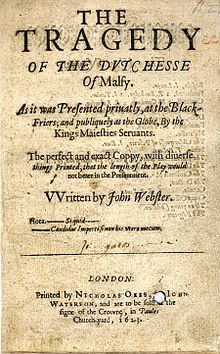John Webster
Appearance

John Webster (c. 1580 – c. 1634) was an English Jacobean dramatist, a late contemporary of William Shakespeare. His tragedies The White Devil and The Duchess of Malfi are often regarded as masterpieces of the early 17th-century English stage.
Quotes
[edit]- Is not old wine wholesomest, old pippins toothsomest, old wood burn brightest, old linen wash whitest? Old soldiers, sweethearts, are surest, and old lovers are soundest.
- Westward Hoe, Act II, scene ii. See also Wine, Friendship.
- I saw him going the way of all flesh.
- Westward Hoe, Act II, scene ii.
- Vain the ambition of kings
Who seek by trophies and dead things
To leave a living name behind,
And weave but nets to catch the wind.- The Devil's Law Case (1623).
- I dare truly and boldly say, that one years exercise therein to ingenious spirits, under able Masters, will produce more real and true fruit, than the studying Aristotelian Philosophy hath brought forth in many centuries. O that the Schools therefore would leave their idle, and fruitless speculations, and not be too proud to put their hands to the coals and furnace, where they might find ocular experiments to confute their fopperies, and produce effects that would be beneficial to all posterities.
- Academiarum Examen, or the Examination of Academies (1654), p. 71; of chemistry.
The White Devil (1612)
[edit]- 'T is just like a summer bird-cage in a garden,—the birds that are without despair to get in, and the birds that are within despair and are in a consumption for fear they shall never get out.
- Act I, scene ii. Compare: "To public feasts, where meet a public rout,— Where they that are without would fain go in, And they that are within would fain go out", John Davies, Contention betwixt a Wife, etc.
- Condemn you me for that the duke did love me?
So may you blame some fair and crystal river
For that some melancholic, distracted man
Hath drown'd himself in 't.- Act III, scene ii.
- Glories, like glow-worms, afar off shine bright,
But look'd too near have neither heat nor light.- Act IV, scene 4. Compare Distance.
- Call for the robin redbreast and the wren,
Since o'er shady groves they hover,
And with leaves and flowers do cover
The friendless bodies of unburied men.- Act V, scene iv.
- But keep the wolf far thence, that's foe to men,
For with his nails he'll dig them up again.- Act V, scene iv.
- Prosperity doth bewitch men, seeming clear;
But seas do laugh, show white, when rocks are near.- Act V, scene vi.
Duchess of Malfi (1623)
[edit]- Glories, like glowworms, afar off shine bright,
But looked to near have neither heat nor light.- Act IV, scene ii.
- Of what is't fools make such vain keeping?
Sin their conception, their birth, weeping:
Their life, a general mist of error,
Their death, a hideous storm of terror.- Act IV, scene ii.
- I know death hath ten thousand several doors
For men to take their exits.- Act IV, scene ii. Compare: "Death hath so many doors to let out life", John Fletcher, The Custom of the Country, act ii, scene 2.
- Heaven-gates are not so highly arched
As princes' palaces; they that enter there
Must go upon their knees.- Act IV, scene ii.
- Cover her face; mine eyes dazzle: she died young.
- Act IV, scene ii.
- Whether we fall by ambition, blood, or lust,
Like diamonds, we are cut with our own dust.- Act V, scene v.
About John Webster
[edit]- Webster was much possessed by death
And saw the skull beneath the skin.- T.S. Eliot, "Whispers of Immortality" from Poems (1920).
- Webster is not concerned with humanity. He is the poet of bile and brainstorm, the sweet singer of apoplexy; ideally, one feels, he would have had all his characters drowned in a sea of cold sweat. His muse drew nourishment from Bedlam, and might, a few centuries later, have done the same from Belsen.
- Kenneth Tynan, review of The Duchess of Malfi at the Aldwych Theatre (1960), from Tynan Left and Right (1967).

